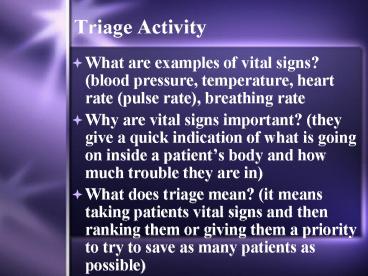Triage Activity PowerPoint PPT Presentation
1 / 23
Title: Triage Activity
1
Triage Activity
- What are examples of vital signs? (blood
pressure, temperature, heart rate (pulse rate),
breathing rate - Why are vital signs important? (they give a quick
indication of what is going on inside a patients
body and how much trouble they are in) - What does triage mean? (it means taking patients
vital signs and then ranking them or giving them
a priority to try to save as many patients as
possible)
2
Key ideas on test1) Specific defense vs.
nonspecific defense2) Antibodies, Antigens,
Antibiotics3) bacteria vs. virus4) Vaccines5)
Vital Signs and Triage6) HIV All vocab words
from the front of the packet are on the test
3
Primary vs. secondary response
- 1st exposure to disease- primary
- Takes time for body to make antibodies
- Sick for a longer period of time
- 2nd exposure to disease- secondary
- Body has already since disease and has the exact
antibody - Sick for shorter period of time (might not even
feel sick at all!)
4
Review questions
- Why is it important for the body to distinguish
material that is part of itself from nonself
material? - Provide 2 examples of immune systems nonspecific
defense mechanisms. - Why are viruses unaffected by antibiotics such as
penicillin and tetracycline? - Describe how vaccinations work
5
Answer to a)
- When immune system cannot distinguish between
self and nonself, it attacks and may damage its
own body tissues. - Autoimmune diseases result of bodys failure to
make this distinction. - Examples rheumatoid arthritis, lupus and
multiple sclerosis
6
Answer to b)
- Nonspecific defense mechanisms include skin,
tears, macrophages - They do not have to recognize the specific
invader, they can defend against many types of
invaders - Specific defense specialized cells (B cells,
helper killer T cells) that recognize and
attack certain invaders only
7
Answer to c)
- Antibiotics kill invaders such as bacteria that
are outside the cells - Viruses live inside the cell and use these host
cells as shields - Antibiotics are not effective against viruses
- To kill viruses- a medication would have to kill
the rest of the cell as well
8
Answer to d)
- Vaccines are weakened or killed pathogens and
are used in very small doses - Small doses are enough to bring on an immune
response but not enough to cause disease symptoms - Because of the immune response, immunity to the
pathogen develops - Any other future exposures to the disease,
trigger a major immune reaction
9
- Antibiotics (like penicillin) only work on
BACTERIA - Vaccinations can work on BACTERIA and VIRUSES
10
Activity 1
- Get card with 4 test subjects
- All 4 people have been exposed to the influenza
virus (FLU) - Decide what their prognosis is. In other words
will the person get better? About how long will
it take? (do your best) - And what effect would taking penicililn have?
11
What is a prognosis?
- A prediction about whether a person will become
ill and if so, how soon he or she will recover
12
Person 1 (healthy) and flu
- In about 7 days, the healthy immune system should
have fought off the virus infection. - Antibiotic (pencillin) ineffective
13
Person 2 (immunosuppressed lack of sleep) and FLU
- Immune system is suppressed although not
completely dysfunctional - Exposure to flu would result in a moderately long
illness, followed by recovery as the weakened
immune system finally mounted an adequate
response during the second week of illness - Penicillin No effect
14
Person 3 (immunosuppressed smoker) and flu
- Immune system is suppressed although not
completely dysfunctional - Exposure to flu likely would result in moderately
long illness, followed by recovery as the
weakened immune system finally mounted an
adequate response during the second week of
illness - Penicillin no effect
15
Person 4 (severely immunosuppressed AIDS) Flu
- Severely immunosuppressed so infection would
linger - Penicillin no effect against flu virus, but it
might have helped fight any bacteria infections
for this vulnerable individual
16
Activity 2
- We dont know the identity of the pathogen
- You do know the prognosis of your Test Subject
- Your job is to identify the unknown pathogen
- What is pathogen 1?
- What is pathogen 2?
- What is pathogen 3?
17
These are the 3 possibilities
- Streptococcus bacterium
- Common cold virus
- Rubella virus
- Which one is pathogen 1? Which is pathogen 2?
Which is pathogen 3?
18
On back of paper
- Write each letter for each scenario
- Write down what each person could have
- For example. Lets do scenario A as a class
19
Scenario A
- Exposed to pathogen 1
- Became mildly ill, but recovered within 7 days
- Was vaccinated earlier for rubella
- Did not take penicillin
- What disease could this person have?
- What could it not be?
20
- The person was vaccinated for rubella, but got
sick anyway. If this person had rubella, he/she
wouldnt have gotten sick at all since they had
the vaccine. - So pathogen 1 cannot be rubella.
- But it could be strep bacteria or the cold virus
- Since the person did not take antibiotic we dont
know if he/she has bacteria or virus infection
21
Scenario B
- Test subject 1 was exposed to pathogen 2
- No signs of illness occurred
- Was vaccinated earlier against rubella
- Did not take penicillin
22
- Might be rubella virus, cold virus or strep
bacteria - Could be rubella, but vaccination prevented
illness - Should have strong immune system, so may be able
to prevent illness from any pathogen
23
Answers
- Pathogen 1 Common cold virus
- Pathogen 2 Rubella virus
- Pathogen 3 Streptococcus bacteria

